
Summary
Here are the key global developments in the coronavirus pandemic from the last few hours:
- Cities and states around the world returned to tighter coronavirus restrictions to battle recurring outbreaks, including India’s IT hub Bangalore which was set to go into a new week-long lockdown on Tuesday as the number of coronavirus cases surged.
- In France masks will become mandatory in all enclosed public spaces within the next few weeks, President Emmanuel Macron has said in a major Bastille Day interview. This comes as a a French study revealed the case of a baby boy infected with coronavirus in the womb This is believed to be first such confirmed case but doctors say infant has made good recovery.
- 6,000 new coronavirus cases in Russia. Russia has reported 6,248 new cases on Tuesday, and 175 deaths in the last 24 hours. That means the confirmed national tally is 739,947, the fourth highest in the world, and the official death toll is 11,614. But the number of cases in Moscow has dropped in recent weeks, and from yesterday rules requiring residents to wear masks outside were relaxed.
- EU drops Serbia and Montenegro from safe list. The European Union has decided to drop Serbia and Montenegro from its safe list of countries from which non-essential travel is allowed, and did not even discuss including the United States given its sharp rise in coronavirus cases, EU officials have said.
Updated
at 2.00pm EDT
Daily new cases in Turkey dropped to fewer than 1,000 for the first time since 11 June, the country’s health minister Fahrettin Koca has said.
There were 992 cases identified in the latest count. Koca said the total number now stood at 214,993, while the death toll rose by 20 on Tuesday to 5,402. Daily cases hit a low of 786 on 2 June, but more than doubled to 1,592 two weeks later after Ankara eased lockdown measures.
The World Health Organization (WHO) is working to ensure vulnerable Latin American nations receive a “subsidised” vaccine at an “affordable” price once it is available, its regional director for the Americas Carissa Etienne has said.
The Latin America region has become the latest pandemic epicentre, with deaths in the region on Monday surpassing the North American death toll for the first time since the start of the outbreak, Reuters reports.
Many Latin American nations are relatively poor, with healthcare systems struggling to cope with the region’s 3.4 million confirmed cases and 146,000 deaths according to the news agency’s data.
In a virtual briefing, Etienne said Pan-American Health Organization (PAHO), WHO’s regional office based in Washington, was to working to “ensure the most vulnerable countries in the region receive the Covid-19 vaccine on a subsidised basis and at an affordable price”.
The global race for a vaccine and treatments has turned into a battle between the world’s wealthiest nations, with rich countries buying up limited drug stocks or procuring future supplies of the most promising potential vaccines.
While the vaccine may be some way off, Latin American nations with small budgets will struggle to compete, experts said.
“What good is a vaccine if people don’t have access to it?” Etienne said.
Singapore’s economy shrank more than 40% in the second quarter of this year as the pandemic plunged the Southeast Asian financial hub into recession for the first time in more than a decade, according to a report of official data by Agence France-Presse (AFP).

Cyclists ride along Marina Bay overlooking the financial business district in Singapore on July 14, 2020 Photograph: Roslan Rahman/AFP/Getty Images
The 41.2% quarter-on-quarter drop was the worst ever recorded in the city-state, which is considered a barometer for the health of global trade.
It marked the second consecutive quarter of contraction, meaning the city state has entered a recession for the first time since 2009, when it was battered by the global financial crisis.
Dutch prime minister Mark Rutte has said he was “not hopeful” of a deal on an EU coronavirus fund this week, despite opening the door to compromise on a key hurdle.
The “frugal four” of the Netherlands, Austria, Denmark and Sweden have said they want the 750-billion-euro recovery package to contain only loans for pandemic-hit states, and not grants.
Rutte told parliament that despite meeting a string of EU leaders in recent days to break the deadlock, he was “quite gloomy about how things will go” at a summit on Thursday.
“I can assure you that we are doing everything we can behind the scenes, but that given how things are going, I am not hopeful,” he said.
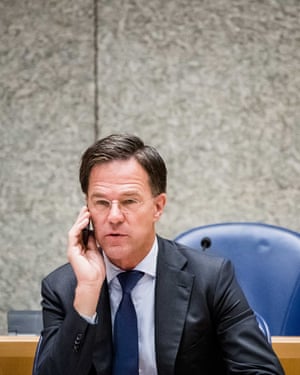
Mark Rutte during a debate in the House of Representatives in the Hague. Photograph: Bart Maat/EPA
The Dutch premier insisted that “we are for loans” which are conditional on tough economic reforms by countries that get the money, such as pension and labour market changes.
“If countries then say ‘but we also want to know what the road to grants is,’ then … I have to be able to explain to the Dutch parliament and all Dutch citizens that in exchange, fundamental reforms that have stalled so far are taking place,” Rutte said.
The Netherlands should also have a right to veto any grant if countries did not carry out those reforms, Rutte said.
“That’s where the balance is, I think, you will have to find it. I’m not so hopeful about that at all,” he concluded.
French president Emmanuel Macron, EU chief Charles Michel and the prime ministers of Italy, Spain and Portugal have all visited the Hague for talks with Rutte in recent days without any sign of a major breakthrough.
Updated
at 1.14pm EDT
Basra Children’s Hospital which specialises in cancer treatment has cut admissions by half since May due to coronavirus, its director said, and is battling to keep children safe from infection with a new isolation ward and testing its staff.
Hospital director Ali Abulhussein al-Idani said that since June, five children were diagnosed with the illness upon admission to the hospital, including a six month-old child, who died of complications.
“The immune system of cancer patients is very weak, it can be close to nil. If a patient (with cancer) catches the coronavirus, he or she will be affected badly and rapidly,” he added.
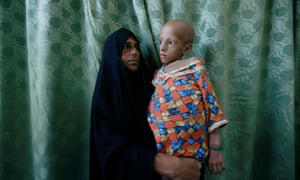
An Iraqi woman carries her daughter who suffers from cancer at the Children’s Hospital for Cancer Diseases in Basra. Photograph: Essam Al-Sudani/Reuters
The hospital has boosted ward cleaning and limited visitors to just one per child, is treating more patients as outpatients, as well as routinely testing staff.
Iraq has registered 81,757 cases of coronavirus including 3,345 deaths as of Tuesday.
EU drops Serbia and Montenegro from safe list
The European Union has decided to drop Serbia and Montenegro from its safe list of countries from which non-essential travel is allowed, and did not even discuss including the United States given its sharp rise in coronavirus cases, EU officials told Reuters.
EU diplomats today approved a proposal from Germany, now holding the rotating EU presidency, to exclude non-EU Serbia and Montenegro because of spreading infections, officials said. There have been anti-government protests in Serbia, initially sparked by the announcement of a new coronavirus lockdown amid a surge in new cases.
The updated list, which will be published in coming hours or days, is only a recommendation and not all of the 27 EU member countries are applying its provisions.
After the exclusion of Serbia and Montenegro, 13 countries remain on the EU list: Algeria, Australia, Canada, China, Georgia, Japan, Morocco, New Zealand, Rwanda, South Korea, Thailand, Tunisia and Uruguay.
Despite China being on the list, travel from there will be allowed only if Chinese authorities also allow in EU visitors. The reciprocity requirement is not applied in the case of the other listed countries.
“China has no intention to open its borders to the EU,” an EU diplomat said with respect to discussions with Beijing.
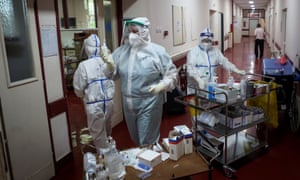
Medical workers bring medications to patients suffering from coronavirus disease (COVID-19) inside the Institute for Orthopaedic Surgery “Banjica”, recently transformed to a Covid hospital, in Belgrade, Serbia. The small Balkan country is experiencing a resurgence of the pandemic. Photograph: Oliver Bunic/AFP/Getty Images
Updated
at 12.41pm EDT
Moderna Inc, one of several organisations racing to develop a coronavirus vaccine, said today that it plans to start late stage clinical trials for its candidate on or around 27, according to its listing for the phase 3 study at clinicaltrials.gov.
Moderna said it will conduct the trial at 87 study locations, all in the US. Moderna’s mRNA-1273 vaccine candidate was the first to enter clinical trials, just eight weeks after the genetic sequence for Covid-19 was published in January.
Moderna
(@moderna_tx)The https://t.co/XvCSRI7uD8 listing for Moderna’s Phase 3 study of mRNA-1273, our #vaccine candidate against COVID-19 is now live. Find more information on the study including site locations here: https://t.co/9uIYZ069JU pic.twitter.com/QkPEoAXw7b
Updated
at 11.44am EDT
Some good news! Saudi Arabian officials have said that the kingdom has seen a decrease in the number of new coronavirus cases over the past seven days.
The kingdom recorded 2,692 new infections on Tuesday, the fourth day in a row the numbers have stayed below 3,000. Saudi Arabia has recorded a total of 237,803 cases with 2,283 deaths.
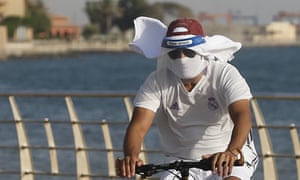
A vacationer rides his bicycle at the Red Sea beach in Jiddah, Saudi Arabia. Photograph: Amr Nabil/AP
The number of new daily infections had reached their highest point of 4,919 on 16 June, but those numbers have been steadily declining since early July, falling below 3,000 for the first time on 10 July.
“We’ve noticed a decrease in the number of cases, and in particular the number of critical cases,” Health Ministry spokesman Mohammed Abdelali told a news conference.
“We’ve noticed a stabilisation of the numbers of cases we’re monitoring and a decline in the curve.”
Spain’s Catalonia region issued a new order to place around 160,000 residents of the Lleida area under confinement to stem a surge in coronavirus infections, defying a judge’s ruling that such a step was unlawful.
The new restrictions, which still need to be approved by another judge after the conflicting orders provoked confusion among residents, would come into force in the city of Lleida and seven towns around it on Wednesday and last for 15 days, Catalan government spokeswoman Meritxell Budo said.
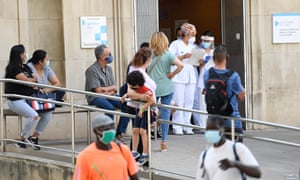
Healthcare workers check a patient’s list as people wait outside the CAP Prat de la Riba primary care centre in Lerida (Lleida). Photograph: Pau Barrena/AFP/Getty Images
The regional government was confident the judge would approve the new decree issued as it gives Catalan authorities a stronger legal footing in tackling outbreaks, she said.
The new restrictions would only allow people to leave their homes for specific activities like working, buying groceries or exercising. Gatherings of more than 10 people would be banned, she said.
Hotels would be closed, as well as restaurants and bars except for food pick-up or delivery.
Residents of Lleida, which lies about 180 km (110 miles) west of Barcelona, have been blocked from leaving the area since 4 July amid a surge in coronavirus infections.
As cases continued to rise, the regional government on Sunday attempted to confine citizens to their homes but a local judge struck down the order, spreading confusion among residents and further uncertainty among local businesses.
Initially one of Europe’s worst hit countries by the pandemic and more than 28,400 people have died, Spain brought the crisis largely under control through a tough national lockdown that was lifted on 21 June.
However, more than 170 localised outbreaks have been recorded since then, with 120 still active and with the Lleida region at the centre.
Louisiana has emerged as a hotspot for the virus in the United States only months after seeming to contain its outbreak.
The Republican vice president, Mike Pence, was scheduled to meet with Louisiana governor, John Bel Edwards, members of the congressional delegation and state health officials to talk about the states response to the disease.
Pence’s visit comes as Louisiana’s confirmed virus cases surged worrying public health experts about the level of virus spread in a state that previously appeared successful in combating its outbreak.
In response to the spike in virus cases and hospitalisations, Edwards enacted a statewide mask mandate for anyone aged over eight.
He also returned bars to take-out and delivery only. Restaurants, casinos, gyms, salons and other businesses remain open with occupancy restrictions.
Iran reports 179 new virus death as authorities announced a decision to once more shutter some businesses in the capital to contain the virus’ resurgence.
The reimposition of restrictive measures comes after the government had progressively lifted them from April to reopen its sanctions-hit economy.
The one-week measure in Tehran includes the closure of gyms, pools, zoos and cafes.
“Holding any social, cultural and religious events and conferences is banned from today for a week,” deputy Tehran governor Hamidreza Goudarzi said.
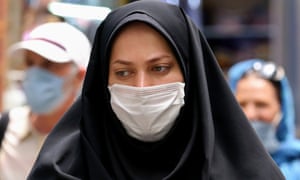
An Iranian women shops at the Tajrish Bazaar market in the capital Tehran. Photograph: Atta Kenare/AFP/Getty Images
The Islamic republic has been struggling to contain the virus since announcing its first cases in mid-February.
It has refrained from enforcing full lockdowns to stop the pandemic’s spread and resorted to closing schools, cancelling public events and banning movement between provinces in March before lifting them.
Official figures have shown an upward trajectory in new confirmed cases since early May, when Iran hit a near two-month low in daily recorded infections.
Health ministry spokeswoman Sima Sadat Lari raised the country’s overall Covid-19 death toll to 13,211 with the 179 fatalities recorded on Tuesday.
She added that 2,521 people had tested positive for the coronavirus in the past 24 hours, raising the total cases confirmed to 262,173.
The rising toll has prompted authorities to make masks mandatory in enclosed public spaces and to allow the hardest-hit provinces to reimpose restrictive measures, with Tehran being one of the latest.

Jon Henley
Masks will become mandatory in all enclosed public spaces in France within the next few weeks, President Emmanuel Macron has said in a major Bastille Day interview.
Masks were already obligatory on public transport and recommended in shops, with many store owners refusing to welcome customers not wearing them.
Macron said there were “signs that the virus is returning somewhat here and there”, with localised outbreaks causing concern among experts and fears of a further uptick as people leave for their summer holidays.
Macron also said France was carrying out about 370,000 Covid-19 tests a week and had the capacity to do twice as many. Testing will soon be available to all without prescription, he said.
A pattern emerging here. The northern Indian state of Bihar, which has a population of about 125 million people, will go into a 15-day lockdown to combat coronavirus, its deputy chief minister said on Tuesday.
“Bihar government has decided on a 15-day lockdown from 16 July to 31 July. All city municipalities, district headquarters, block headquarters will stay under lockdown. The guidelines are being finalised,” Sushil Kumar Modi tweeted.
The announcement came a few hours before the southern city and IT hub Bangalore was due to go into a week-long lockdown. Other states and cities have also imposed restrictions as India’s caseload nears 1 million.
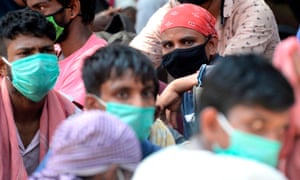
Stranded migrant labourers gather at an assembling centre to board on a special train to Bihar Photograph: Arun Sankar/AFP/Getty Images
On Tuesday, Bihar reported a record 1,432 cases, the third consecutive day with more than 1,000 new infections, taking the impoverished state’s total to almost 19,000 with 134 deaths according to the local health authorities.
“There is no medicine or vaccine for corona. We have to ensure that we cover our faces with masks, handkerchiefs or towels,” the deputy chief minister said.
After imposing one of the world’s strictest lockdowns in late March, India has been steadily easing rules to lessen the huge economic impact, particularly on hundreds of millions of poor Indians who lost their jobs.
But infections have continued to soar, passing 900,000 on Monday with almost 24,000 deaths, according to health ministry figures that many experts say underplay the severity of the situation.
Updated
at 8.52am EDT


